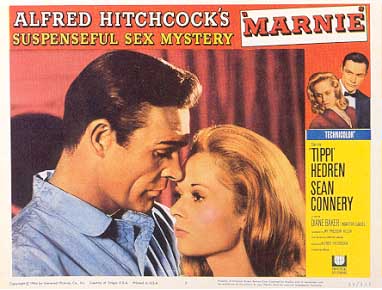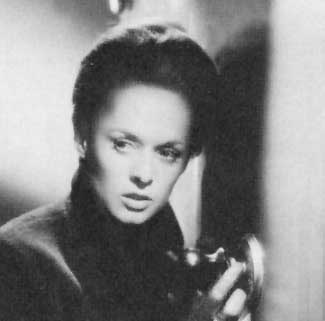Marnie
(1964, dir. by Alfred Hitchcock)
Hitchcock, The Master of Suspense, delivers another engrossing tale, a fascinating study of a multi-phobic, sexually repressed, bank robbing young woman (Whew! Now there's an interesting character for you!). Rather than have the suspense generated by slowly discovering the title character's illegal actions, this movie derives its mystery and tension from uncovering the psychological reasons behind those actions. Through his storytelling and scene compositions, Hitch directs us not toward figuring out if Marnie has committed crimes - he lets us in on her guilt at the very beginning - but instead we are guided to ask why.
 Early on we are given clues that whatever it is that is driving and haunting Marnie (Tippi Hedren) has something to do with her childhood and her mother (Louise Latham). Craving her mother's approval and affection, Marnie lavishes pricey gifts (bought with money from her various schemes) on her mother, who while proud of her daughter, seemingly forces herself to remain emotionally distant from her. Any mention by Marnie of puzzling childhood memories, such as the color red and the tapping on the window, is disturbing to her mother and quickly dismissed. Obviously there is a secret being kept, but we aren't let in on it just yet.
Early on we are given clues that whatever it is that is driving and haunting Marnie (Tippi Hedren) has something to do with her childhood and her mother (Louise Latham). Craving her mother's approval and affection, Marnie lavishes pricey gifts (bought with money from her various schemes) on her mother, who while proud of her daughter, seemingly forces herself to remain emotionally distant from her. Any mention by Marnie of puzzling childhood memories, such as the color red and the tapping on the window, is disturbing to her mother and quickly dismissed. Obviously there is a secret being kept, but we aren't let in on it just yet.
After an unsatisfying visit with Mama, Marnie takes on a new identity and a new job at another bank. Unbeknownst to Marnie, her boss Mark Rutland (Sean Connery) is wise to her duplicitous behavior, and it both fascinated and attracted by this. He's intent on discovering exactly what it is that makes her tick, even if he has to use forceful methods to achieve his goal. While Mark does genuinely want to help Marnie, and convinces himself that what he is doing is for her own good, there is something decidedly less than benevolent about his behavior. He's a bored rich boy who has made a hobby of taming wild animals, with Marnie possibly being the latest "animal" added to his collection.
 Other than the appallingly bad background designs (especially the outside shot of Marnie's mother's home), this movie is wonderful in every way. Complex, flawed characters, inventive camera angles and perfect story pacing by Hitch, plus a soaring and beautiful score by Bernard Herrmann all make for a most memorable movie. But most importantly are the performances and Hitch has assembled an outstanding cast. Hedren has never been better, giving Marnie a cool, strong, nearly impenetrable protective shell with just the right touch of vulnerability. Connery is charming and gorgeous, while simultaneously imbuing Mark's glib lines with a sense of sadness and hidden pain. Diane Baker as Mark's jealous sister-in-law is as sensual and vivacious as Marnie is repressed. Why was this dynamic actress not given leading roles in movies? A real pity.
Other than the appallingly bad background designs (especially the outside shot of Marnie's mother's home), this movie is wonderful in every way. Complex, flawed characters, inventive camera angles and perfect story pacing by Hitch, plus a soaring and beautiful score by Bernard Herrmann all make for a most memorable movie. But most importantly are the performances and Hitch has assembled an outstanding cast. Hedren has never been better, giving Marnie a cool, strong, nearly impenetrable protective shell with just the right touch of vulnerability. Connery is charming and gorgeous, while simultaneously imbuing Mark's glib lines with a sense of sadness and hidden pain. Diane Baker as Mark's jealous sister-in-law is as sensual and vivacious as Marnie is repressed. Why was this dynamic actress not given leading roles in movies? A real pity.
One of the interesting things about being a Hitchcock fan is finding parallels between two or more of his movies. In the case of Marnie, quite a few parallels come to mind: the emotionally crippling mother in Psycho; the phobias of Vertigo; the "heroine" being forced into marriage as in Notorious; the less than welcome environment of the family mansion as in Rebecca, Notorious, and Under Capricorn; the psychology of Spellbound. Most obvious is the parallel to Spellbound - the sight of certain objects causing momentary flashbacks and fear, the unraveling of the mystery through use of psychology, as well as a love story, though in Marnie this love is far darker and not wholly reciprocated.
While Spellbound and its emphasis on Freudian analysis has made it somewhat dated, Marnie's appeal is still fresh. In fact, it probably fits in better than ever in this day and age with the "Oprahfication" of all of our problems, where we all engage in pop psychology and offer our own diagnoses on all aspects of human behavior. No doubt Marnie and Mark would've made for interesting guests on "Oprah", but I think it's safe to say their story was better off being told to us by the master himself, Hitchcock.

Back to Classics Back to Home
Back to Home
 Early on we are given clues that whatever it is that is driving and haunting Marnie (Tippi Hedren) has something to do with her childhood and her mother (Louise Latham). Craving her mother's approval and affection, Marnie lavishes pricey gifts (bought with money from her various schemes) on her mother, who while proud of her daughter, seemingly forces herself to remain emotionally distant from her. Any mention by Marnie of puzzling childhood memories, such as the color red and the tapping on the window, is disturbing to her mother and quickly dismissed. Obviously there is a secret being kept, but we aren't let in on it just yet.
Early on we are given clues that whatever it is that is driving and haunting Marnie (Tippi Hedren) has something to do with her childhood and her mother (Louise Latham). Craving her mother's approval and affection, Marnie lavishes pricey gifts (bought with money from her various schemes) on her mother, who while proud of her daughter, seemingly forces herself to remain emotionally distant from her. Any mention by Marnie of puzzling childhood memories, such as the color red and the tapping on the window, is disturbing to her mother and quickly dismissed. Obviously there is a secret being kept, but we aren't let in on it just yet.
 Other than the appallingly bad background designs (especially the outside shot of Marnie's mother's home), this movie is wonderful in every way. Complex, flawed characters, inventive camera angles and perfect story pacing by Hitch, plus a soaring and beautiful score by Bernard Herrmann all make for a most memorable movie. But most importantly are the performances and Hitch has assembled an outstanding cast. Hedren has never been better, giving Marnie a cool, strong, nearly impenetrable protective shell with just the right touch of vulnerability. Connery is charming and gorgeous, while simultaneously imbuing Mark's glib lines with a sense of sadness and hidden pain. Diane Baker as Mark's jealous sister-in-law is as sensual and vivacious as Marnie is repressed. Why was this dynamic actress not given leading roles in movies? A real pity.
Other than the appallingly bad background designs (especially the outside shot of Marnie's mother's home), this movie is wonderful in every way. Complex, flawed characters, inventive camera angles and perfect story pacing by Hitch, plus a soaring and beautiful score by Bernard Herrmann all make for a most memorable movie. But most importantly are the performances and Hitch has assembled an outstanding cast. Hedren has never been better, giving Marnie a cool, strong, nearly impenetrable protective shell with just the right touch of vulnerability. Connery is charming and gorgeous, while simultaneously imbuing Mark's glib lines with a sense of sadness and hidden pain. Diane Baker as Mark's jealous sister-in-law is as sensual and vivacious as Marnie is repressed. Why was this dynamic actress not given leading roles in movies? A real pity.

 Back to Home
Back to Home